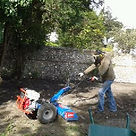flower bed
It is luxury to have fresh flowers on display at home on a daily basis. We will maintenance you flower bed with really special care to give you many of beatiful flowers. We will help you keep your garden a haven for bees by avoiding pesticides.

preparing beds and cultivation
Cultivation is the act of digging into or cutting up an existing soil bed in order to better prepare it for planting.
Effective organic soil cultivation will help control weeds, improve the aeration of the soil and produce healthy plants. Cultivation offers the chance to better apply fertilise.

planting, propagation and transplanting
Most perennial flowers will need to be divided every two, three years to remain vigorous and continue blooming after season. After several seasons of growing, these perennial plants will begin to die out in the center. Dividing perennial plants gives you healthier, longer lived plants and the bonus of more plants.

weeding, fertilizing and mulching
Mulching is used to retain moisture in the soil, suppress weeds, keep the soil cool and make the garden bed look more attractive. As a mulch we use inorganic (gravel, stones, landscape fabrics) or organic materials (chopped leaves,bark, straw, compost, wood chips). Organic mulches help improve the soil’s fertility, as they decompose.
We also control the weeds by hand-pulling or hoeing them.

dead-heading
Deadheading flowers is a garden maintenance task that must be done if you want to have flowers throughout the garden season.Flowers can often repeat bloom if the old, dying flowers are removed. If they remain on the plant, they will go to seed and stop producing flowers. Even many flowers that bloom only once per season benefit from deadheading, because the plant puts its energy into strengthening itself instead of producing seed.

insect, fungal and pest control
All flower beds are monitored during our maintenance program to ensure early detection of existing or anticipated problems. Our Maintenance Program focuses on maintaining healthy plants that stimulate their natural defense systems. If, however, pests become a problem, we will use integrated pest management (I.P.M.) methods to maintain a more natural balance.
